AFTER THE SLAVERY ABOLITION; AFRICANS STILL WANT TO BE MODERN SLAVES TO THE WESTERNERS
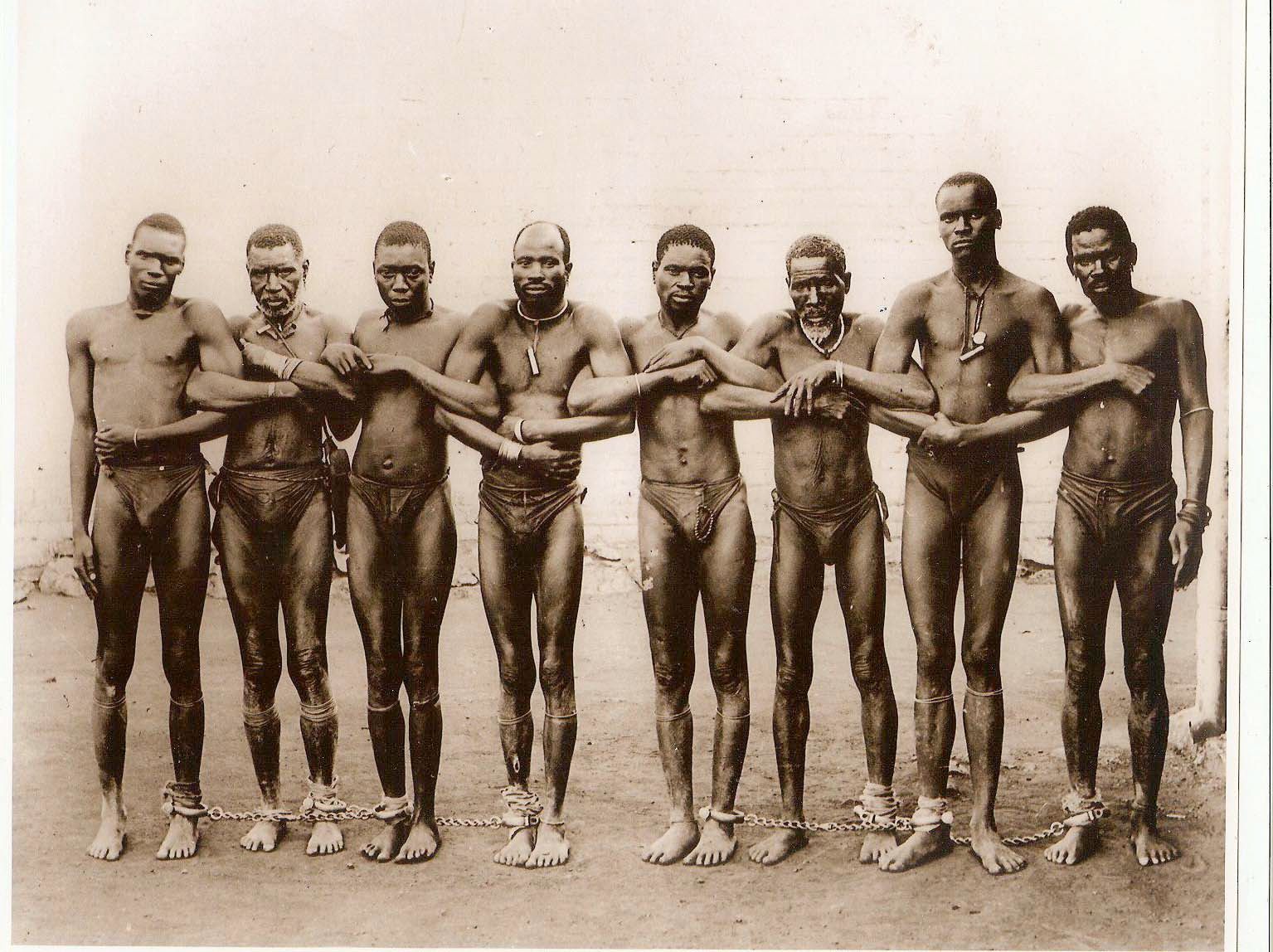
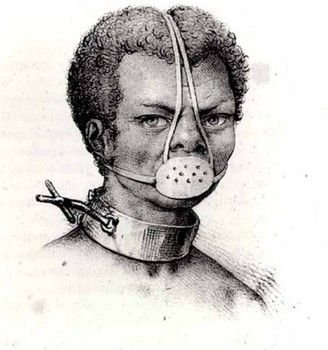
What is Slavery
Slavery is any system in which principles of property law are applied to people, allowing individuals to own, buy and sell other individuals, as a de jure form of property. A slave is unable to withdraw unilaterally from such an arrangement and works without remuneration. Many scholars now use the term chattel slavery to refer to this specific sense of legalized, de jure slavery. In a broader sense, however, the word slavery may also refer to any situation in which an individual is de facto forced to work against their own will. Scholars also use the more generic terms such as free labor or forced labor to refer to such situations.
Slavery also refers to a condition in which individuals are owned by others, who control where they live and at what they work. Slavery had previously existed throughout history, in many times and most places. To be a slave is to be owned by another person. A slave is a human being classed as property and who is forced to work for nothing. An enslaved person is a human being who is made to be a slave. This language is often used instead of the word slave, to refer to the person and their experiences and to avoid the use of dehumanizing language.
There are four different types of slavery know which is highlighted below
A chattel slavery is an enslaved person who is owned for ever and whose children and children's children are automatically enslaved. Chattel slaves are individuals treated as complete property, to be bought and sold. Chattel slavery was supported and made legal by European governments and monarchs. This type of enslavement was practiced in European colonies, from the sixteenth century onward.Typically, under the chattel slave system, slave status was imposed on children of the enslaved at birth. Although it dominated many different societies throughout human history, this form of slavery has been formally abolished and is very rare today.
Bonded slavery: Indenture, otherwise known as bonded labor or debt bondage, is a form of unfree labor under which a person pledges himself or herself against a loan. The services required to repay the debt, and their duration, may be undefined. Debt bondage can be passed on from generation to generation, with children required to pay off their progenitors' debt. It is the most widespread form of slavery today.Debt bondage is most prevalent in South Asia. in this form of slavery, once the person pays back his loan, he becomes free.
Forced labor, or unfree labor, is sometimes used to refer to when an individual is forced to work against their own will, under threat of violence or other punishment, but the generic term unfree labor is also used to describe chattel slavery, as well as any other situation in which a person is obliged to work against their own will and a person's ability to work productively is under the complete control of another person. This may also include institutions not commonly classified as slavery, such as serfdom, conscription and penal labor. While some unfree laborers, such as serfs, have substantive, de jure legal or traditional rights, they also have no ability to terminate the arrangements under which they work, and are frequently subject to forms of coercion, violence, and restrictions on their activities and movement outside their place of work.
Forced marriages or early marriages are often considered types of slavery. Forced marriage continues to be practiced in parts of the world including some parts of Asia and Africa. Forced marriages may also occur in immigrant communities in Europe, the United States, Canada and Australia. Ritual servitude where girls and women are pledged to priests or those of higher castes is a practice sometimes found in West Africa. Marriage by abduction occurs in many places in the world today.
History of Slavery in Africa
Whether slavery existed within sub-Saharan African societies before the arrival of Europeans is hotly contested among African studies scholars. What is certain is that Africans were subjected to several forms of slavery over the centuries, including chattel slavery under both the Muslims with the trans-Saharan slave trade and Europeans through the trans-Atlantic slave trade. Slavery existed in Africa, but it was not the same type of slavery that the Europeans introduced. The European form was called chattel slavery. A chattel slave is a piece of property, with no rights. Slavery within Africa was different. A slave might be enslaved in order to pay off a debt or pay for a crime. Slaves in Africa lost the protection of their family and their place in society through enslavement. But eventually they or their children might become part of their master’s family and become free. This was unlike chattel slavery, in which enslaved Africans were slaves for life, as were their children and grandchildren.Africans usually enslaved ‘other’ people, not their own particular ethnic, or cultural, group. Slaves were taken as prisoners of war, or enslaved in payment for debt or as punishment for crime. This enslavement was usually on a small scale. It was enough to supply the demand for slaves within Africa, but not enough to supply the demand from outside. As the demand from outsiders such as Arabs and Europeans grew, warfare and raids to get slaves and the kidnapping of individuals increased. Europeans wanted to buy enslaved Africans to work on the land they owned on the Caribbean islands and in America. They chose Africans for a number of reasons, one being because they were used to farming. Pictured here is a 20th century hoe, a tool used to work the soil. It is from the Igbo people of Nigeria, West Africa.
How Slave Trade was Abolished
The important of African slaves was outlawed by an act of Congress passed in 1807, and signed into law by President Thomas Jefferson. The law was actually rooted in an obscure passage in the U.S. Constitution, which had stipulated that importing slaves could be prohibited 25 years after the ratification of the Constitution. Though the end of the international slave trade was a significant piece of legislation, it actually did not change much in a practical sense. The importation of slaves had already been decreasing since the late 1700s. (However, if the law had not gone into effect, the importation of slaves may have accelerated as the growth of the cotton industry accelerated following the widespread adoption of the cotton gin.) It's important to note that the prohibition against importing African slaves did nothing to control the domestic traffic in slaves and the interstate slave trade. In some states, such as Virginia, changes in farming and the economy meant slave owners did not need great numbers of slaves. Meanwhile, planters of cotton and sugar in the Deep South needed a steady supply of new slaves. So a thriving slave-trading business developed in which slaves would typically sent southward. It was common for slaves to be shipped from Virginia ports to New Orleans, for instance. Solomon Northup, the author of the memoir Twelve Years a Slave, endured being sent from Virginia to bondage on Louisiana plantations. And, of course, an illegal traffic in slave trading across the Atlantic Ocean still continued. Ships of the U.S. Navy, sailing in what was called the African Squadron, were eventually dispatched to defeat the illegal trade.
How Slave Trade was Banned in 1807
When the US Constitution was written in 1787, a generally overlooked and peculiar provision was included in Article I, the part of the document dealing with the duties of the legislative branch:
Section 9. The migration or importation of such persons as any of the states now existing shall think proper to admit, shall not be prohibited by the Congress prior to the year one thousand eight hundred and eight, but a tax or duty may be imposed on such importation, not exceeding ten dollars for each person.
In other words, the government could not ban the importation of slaves for 20 years after the adoption of the Constitution. And as the designated year 1808 approached, those opposed to slavery began making plans for legislation that would outlaw the trans-Atlantic slave trade.
A senator from Vermont first introduced a bill to ban the importation of slaves in late 1805, and President Thomas Jefferson recommended the same course of action in his annual address to Congress a year later, in December 1806. The law was finally passed by both houses of Congress on March 2, 1807, and Jefferson signed it into law on March 3, 1807. However, given the restriction imposed by Article I, Section 9 of the Constitution, the law would only become effective on January 1, 1808. In subsequent years the law would have to be enforced, and at times the US Navy dispatched vessels to seize suspected slave ships. The African Squadron patrolled the west coast of Africa for decades, interdicting ships suspected of carrying slaves.
The 1807 law ending the importation of slaves did nothing to stop the buying and selling of slaves within the United States. And, of course, the controversy over slavery would continue for decades, and would not be finally resolved until the end of the Civil War and the passage of the 13th Amendment to the Constitution.
MODERN SLAVERY IN AFRICA
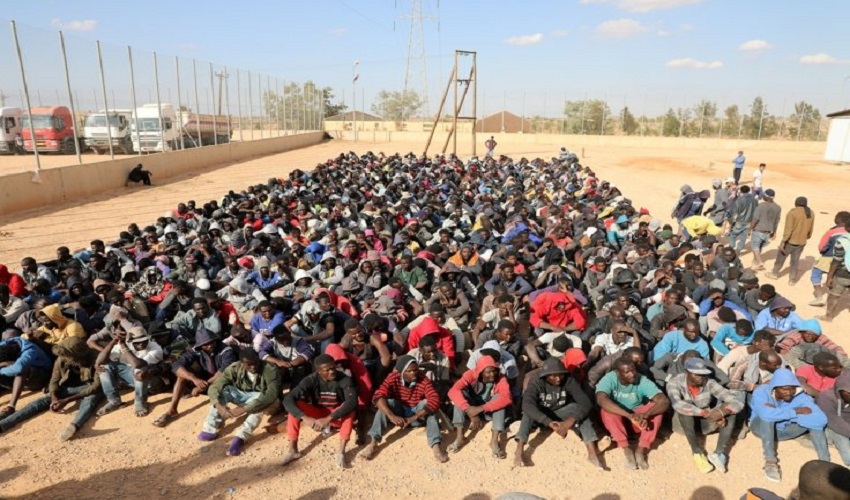
Despite the fact that slavery has been abolished in 1807, the Africans yet don't want to leave their masters alone. the search for better life and greener pastures has made Africans a modern slave. it wont be to our surprised that forced labor is still been practice especially a place a Libya. Refuges and illegal immigrant who want to leave for Europe are the ones who most times fall victims of slave trade and forced labor.
Why is there a slave trade in Libya?
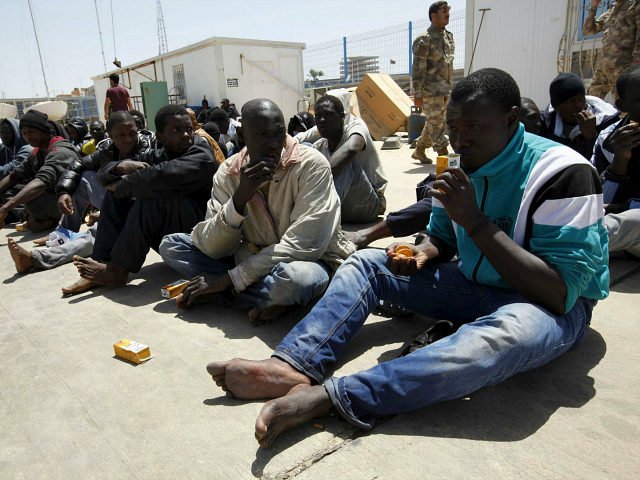
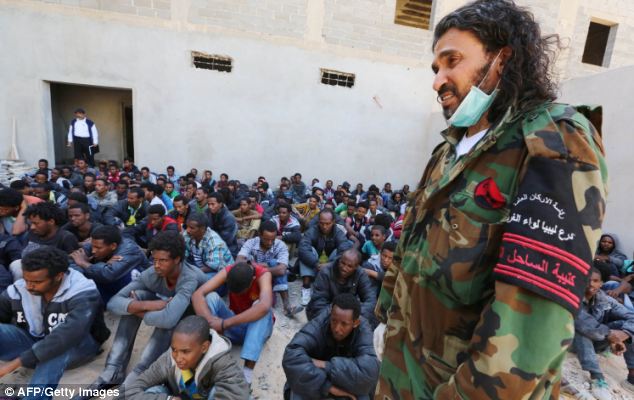
Libya is the main transit point for refugees and migrants trying to reach Europe by sea. In each of the last three years, 150,000 people have made the dangerous crossing across the Mediterranean Sea from Libya. For four years in a row, 3,000 refugees have died while attempting the journey, according to figures from the International Organization for Migration (IOM), the U.N.’s migration agency.
The Libyan Coast Guard — supported with funds and resources from the E.U. and more specifically, Italy — has cracked down on boats smuggling refugees and migrants to Europe. With estimates of 400,000 to almost one million people now bottled up Libya, detention centers are overrun and there are mounting reports of robbery, rape, and murder among migrants, according to a September report by the U.N. human rights agency. Conditions in the centers have been described as “horrific,” and among other abuses, migrants are vulnerable to being sold off as laborers in slave auctions.
“It’s a total extortion machine,” Lenard Doyle, Director of Media and Communications for the IOM in Geneva tells TIME. “Fueled by the absolute rush of migrants through Libya thinking they can get out of poverty, following a dream that doesn’t exist.” The IOM said in April that it had documented reports of “slave markets” along the migrant routes in North Africa “tormenting hundreds of young African men bound for Libya.”
How to stop Modern Slavery and Human Trafficking
modern slavery is caused as a result of human trafficking. They lure innocent boys and girls into believing that there is a life better than the one they see. this as a result force them into fantasy and imaginary journey to a better life. At the end they meet a big disappointment. There are various ways into which we can stop human trafficking.
Learn the indicators of human trafficking so you can help identify a potential trafficking victim. Human trafficking awareness training is available for individuals, businesses, first responders, law enforcement, educators, and federal employees, among others.
If you are in the United States and believe someone may be a victim of human trafficking, report your suspicions to law enforcement by calling 911 or the 24-hour National Human Trafficking Hotline line at 1-888-373-7888.
Trafficking victims, including undocumented individuals, are eligible for services and immigration assistance.Be a conscientious and informed consumer. Discover your slavery footprint, ask who picked your tomatoes or made your clothes, or check out the Department of Labor’s List of Goods Produced by Child Labor or Forced Labor. Encourage companies to take steps to investigate and prevent human trafficking in their supply chains and publish the information, including supplier or factory lists, for consumer awareness.
Volunteer and support anti-trafficking efforts in your community.
Meet with and/or write to your local, state, and federal government representatives to let them know you care about combating human trafficking, and ask what they are doing to address it.
Host an awareness-raising event to watch and discuss films about human trafficking. For example, learn how modern slavery exists today; watch an investigative documentary about sex trafficking; or discover how human trafficking can affect global food supply chains. Also, check out CNN’s Freedom Project for more stories on the different forms of human trafficking around the world.
Organize a fundraiser and donate the proceeds to an anti-trafficking organization.
Encourage your local schools to partner with students and include modern slavery in their curricula. As a parent, educator, or school administrator, be aware of how traffickers target school-aged children.
Be well-informed. Set up a web alert to receive current human trafficking news. Become familiar with public awareness materials available from the Department of Health and Human Services or the Department of Homeland Security.
Work with a local religious community or congregation to help stop trafficking by supporting a victim service provider or spreading awareness of human trafficking.
10 Businesses: Provide jobs, internships, skills training, and other opportunities to trafficking survivors.
Students: Take action on your campus. Join or establish a university club to raise awareness about human trafficking and initiate action throughout your local community. Consider doing one of your research papers on a topic concerning human trafficking. Request that human trafficking be included in university curricula.
Health Care Providers: Learn how to identify the indicators of human trafficking and assist victims. With assistance from anti-trafficking organizations, extend low-cost or free services to human trafficking victims.
Journalists: The media plays an enormous role in shaping perceptions and guiding the public conversation about human trafficking. Here are some media best practices on how to effectively and responsibly report stories on human trafficking.
Attorneys: Offer human trafficking victims legal services, including support for those seeking benefits or special immigration status. Resources are available for attorneys representing victims of human trafficking.
How to stop Slavery
Modern day slavery still exists and devastates the lives of more than 20 million people worldwide – including children, sent into slavery because their families are too poor to provide for them. All too often we think that slavery is an “out there” thing that doesn’t affect or impact our suburban neighborhoods. The truth is that where a vulnerable population exists, so do slavery and human trafficking. One of the most important keys to ending slavery is for we who are free to educate ourselves, advocate, and act on behalf of those in bondage.
Gain Knowledge: It’s okay to admit that you don’t know a lot about modern day slavery or how it impacts the lives of millions worldwide. Start there, look online to understand the plight of modern day slaves and what someone like you can do to help. Once you gain awareness, you have one of the most important tools needed to help.
Shop Informed: Many companies use low wage workers overseas in unsafe and unsanitary factories. Sadly, this can sometimes lead to forced labor and child slavery. If you want to ensure your dollars are being spent ethically, do a quick search to check out what your favorite brands are doing to fight slavery. There are ethical businesses worldwide who are doing everything they can to ensure freedom and equal rights at every level of their production, so choose to buy from one of them.
Support Anti-Slavery Organizations: Ending slavery in our lifetime will not only take education, it will take resources. An easy way to start making a difference is to donate to an organization that’s hard at work in the trenches. Top charities like Restavek Freedom have local branches overseas with the cultural knowledge and staff needed to transition slaves into freedom.
Speak Up: If you belong to a local religious organization or nonprofit group, see what you can do to start raising the funds and awareness needed to end slavery in our lifetime. Just by speaking up and sharing your passion, you can inspire others to make a difference as well.
Be Social: We must advocate the plight of the enslaved, at the top of our lungs when necessary. These days that can mean sharing enlightening articles and organizations on your social feeds to educate those who may not be aware.
Volunteer: One you’ve educated yourself on slavery, take a look at what you can do to help. Volunteer at a local anti-trafficking organization or contact your city services to see what exists for victims of trafficking and slavery in your area. You don’t necessarily have to travel overseas to make an impact.
Child Sponsorship: While children are not the only enslaved population worldwide, they are the most vulnerable and at risk, especially in countries like Haiti where poverty has taken hold. 1 out of 15 children is sent in restavek : given to a host family to help with domestic chores in the hope of a better life. In reality, they become slaves and work endlessly for no pay. Child sponsorship can ensure that kids trapped in the restavek system have access to education and see their basic needs fulfilled.
thanks for reading.
It is time we release ourselves from all forms of slavery and look at the way forward for our people. Africa keeps on suffering and it seems all that our leaders do is sell us. Our youth are suffering and seeking greener pastures and ending up mordern slaves is not a surprise to me. I lost a brother in Libya because of unemployment which pushed him to travel only to meet his untimely death. Africa must arise and seek to unite and bring up good policiesgeared toward ending all forms of slavery. Our developmental policies are hijacked and all we do is beg just to survive. It is my hope cryptocurrency will open doors for development in our sub region. Your post have been selected as the winner for @wafrica post of the day and hence received a 100% upvote boost by @wafrica.curators. Steemon....
.....by @steemgh curator for @wafrica
I ALSO BELIEVE PROPER AWARENESS WOULD EDUCATE OUR PEOPLE TO KNOW THAT THERE IS NO GREENER PASTURE ANYWHERE. WE MUST CULTIVATE OUR OWN LAND
Congratulations @olumzy! You have completed some achievement on Steemit and have been rewarded with new badge(s) :
Click on any badge to view your own Board of Honor on SteemitBoard.
To support your work, I also upvoted your post!
For more information about SteemitBoard, click here
If you no longer want to receive notifications, reply to this comment with the word
STOP